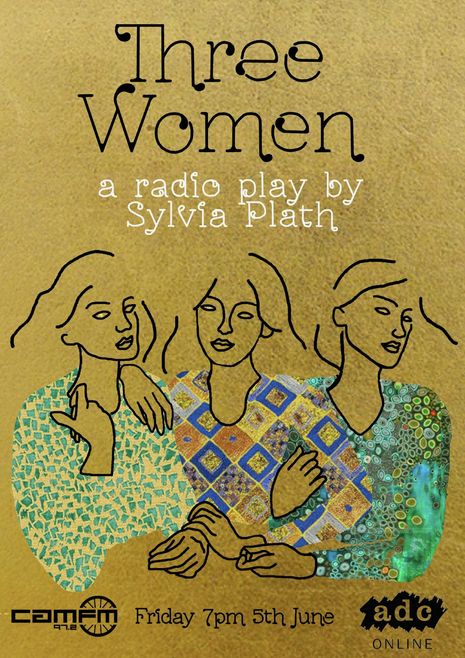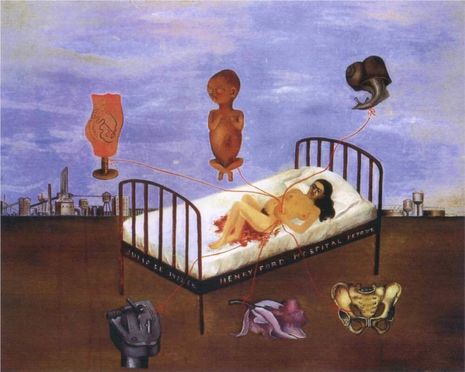Three Women – The Female Force Unlike Any Other
Director Ella Gold discusses her upcoming production of Plath’s Three Women, ‘the perfect play for an isolated world’.

‘Be stoic when necessary & write - you have seen a lot, felt deeply & your problems are universal enough to be made meaningful - WRITE -’
This quote from Sylvia Plath’s notes-to-self during her first year at Cambridge was blu-tacked to my first-year self’s wall, while I struggled through essay after essay, and wrote very little. I spent my time trying to bring up Plath’s name at every possible opportunity, convinced it would either make me a better English student, or make me cooler. It did neither of those things. Yet when the world fell apart, and ADC Online rose phoenix-like from the ashes of our former lives, you can imagine how thrilled I was at the prospect of resurrecting my most pretentious first-year passion. And now it’s being broadcast on CamFM in just a few days! And it’s going to be immense! And you should listen! And, from a place of absolutely no bias whatsoever, I will now tell you why.
Like all of us right now, these three women are connected virtually where they cannot exist together physically.
Sylvia Plath’s ‘Three Women’ is a play I’ve had my eye on for some time now. I was first exposed to it at school, and I was instantly drawn in by the extraordinary language - witness the coinage of the word ‘mountainy’, which you’ll have the absolute pleasure of hearing uttered beautifully in Jade’s dulcet, Liverpudlian tones - and the overall hopefulness of the piece. When most people think of Plath, they think of the depressed author of ‘The Bell Jar’ who ultimately stuck her head in an oven. They think of a woman struggling with grief, obsessed with death, and controlled by an overbearing husband, a woman who knew suffering intimately and wrote it into her work. All of these things are, of course, true. But few people know of the other side to Plath; the playwright of a narrative of hope, healing and regrowth. Now, don’t get me wrong, ‘Three Women’ is not without its darkness. It takes us into the minds of women who find themselves torn from their own identities and grappling with losses from which they do not know how to recover. It is twisted, terrifying and tumultuous, but it is punctuated by stunning moments of light shining through the cracks.
This half-hourlong poem-play follows three different experiences of pregnancy: one ending in motherhood, one in adoption and one in miscarriage. The three women of Plath’s story are identified merely by societal signifiers - ‘Wife’, ‘Secretary’ and ‘Girl’, universalising their experiences as those of womanhood, rather than individual plights. Every woman will hear herself at some point in the words of these women - the real beauty of the play is its ache of familiarity, even for someone who has undergone none of the experiences described.
It is also the perfect play for an isolated world. Performed entirely in monologues, by unconnected characters unaware of one another, it tracks how various experiences can unexpectedly collide, as the three women follow remarkably similar emotional journeys, despite their vastly different lives. It is a play recorded in three separate rooms, not merely as necessitated by lockdown, but because it takes place in three entirely separate places. Like all of us right now, these three women are connected virtually where they cannot exist together physically.
Wife decides that ‘I shall meditate upon normality’, a meditation I think many of us have similarly indulged in over the last few months. Like the three women of this play, we are all looking towards a new kind of normal, a world in which we will exist differently. This masterpiece written in the 60s feels to me as if it could just as easily have been written yesterday.

Our production of ‘Three Women’ really ought to be renamed ‘Eight Women’. Georgie, Lydia, Jade, Frances, Ella, Eve and Martha are some of the most wonderful women I’ve met, and this preview is, more than anything, my excuse to sing their praises. They are brilliant, creative, hilarious, dependable, interesting and interested women, who have made this challenge of remote theatre-making such a joy for me. Watching Georgie, Lydia and Jade fall just as in love with this play as I am has been so lovely, and the thoughtfulness with which these superbly talented women have approached each and every line of Plath’s writing is admirable. Frances has been a wonderfully tireless producer, and Ella’s glorious publicity design is just as beautiful as the writing itself. Eve’s stunning compositions had me tearing up on first listen, and Martha has been a fantastic associate director, providing that final boost which this production truly deserves. I frankly could not have asked for a better team, I feel incredibly lucky to have them all and I truly urge you to tune in and listen to their work in all its glory.
If you’re looking for some beautiful descriptions of the university town we all love and miss so much, a half-hour of escapism from the madness of the world, or simply want to up your street cred like eighteen-year-old Ella, then I highly recommend joining me and these seven women on CamFM and the ADC's YouTube Channel at 7pm, June 5th. You won’t be sorry.
 Interviews / You don’t need to peak at Cambridge, says Robin Harding31 December 2025
Interviews / You don’t need to peak at Cambridge, says Robin Harding31 December 2025 Comment / What happened to men at Cambridge?31 December 2025
Comment / What happened to men at Cambridge?31 December 2025 News / Unions protest handling of redundancies at Epidemiology Unit30 December 2025
News / Unions protest handling of redundancies at Epidemiology Unit30 December 2025 Features / ‘Treated like we’re incompetent’: ents officers on college micromanagement30 December 2025
Features / ‘Treated like we’re incompetent’: ents officers on college micromanagement30 December 2025 News / Varsity’s biggest stories of 202531 December 2025
News / Varsity’s biggest stories of 202531 December 2025









